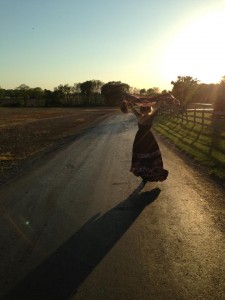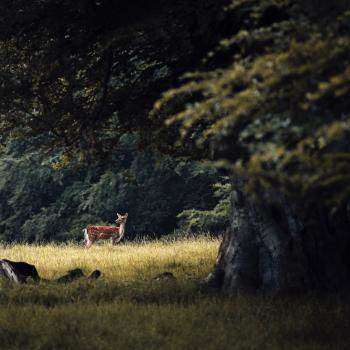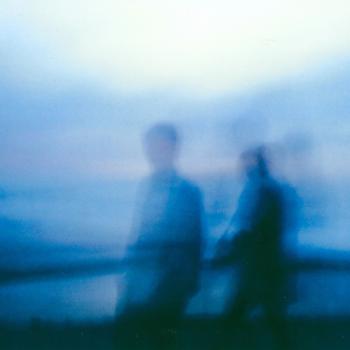By Meredith Holladay
September 3 marked the release of Over the Rhine’s newest album Meet Me at the Edge of the World, a double album of nineteen songs. Karin Bergquist and Linford Detweiler have been making music together since 1989, the same year Image Journal was founded. Both have a rich identity of exploring the outskirts of art, faith, and mystery.
Linford and Karin crowd-sourced funding for their previous album, The Long Surrender, the new record, and with Meet Me, they even opened Nowhere Farm—their farm in southern Ohio—to contributing fans for two nights of concerts, food, and stories. Welcoming fans to their farm was important, as the place has a unique presence on the new album.
After moving to their farm, Linford’s father gave them the advice to “leave the edges wild,” an idea that has captivated them in their cultivation of both their land and their music. I spoke to Linford about place, songwriting, the sacred, and what’s next for Over the Rhine.
Meredith Holladay: Describe the experience of having your fans at Nowhere Farm?
Linford Detweiler: It was meaningful—a little nerve-wracking for Karin to contemplate having 500 folks in her back yard, but a lovely weekend. We put up a circus tent and played the songs that had grown out of the soil of Nowhere Farm for the folks that pitched in generously to help us record Meet Me at The Edge Of The World. When the tent came down, we couldn’t tell anything had happened—no trash lying around. Those that attended were very respectful. It felt like a celebration.
MH: Can you speak to the role of the audience in your songwriting and performing? You write about a sense of gratitude for folks finding your music and “giving it a good life.” To what extent do you respond to your audience?
LD: Karin, my wife and partner in crime, had the good sense to begin telling our audience that without them we’d be homeless. And it’s true. Everything we own, we bought for a song. And we try to treat our audience as extended musical family. We’ve learned a lot about our music from our listeners, and we are blessed with a ragtag company of folks who complete the circle. Songs are meant to be shared.
That being said, every writer has to have his or her own deeply held standards of perfection. We rarely hit the mark, but we keep trying. And a work of art is an offering. You never know if you’ll receive much of anything in return. So when we’re writing, we’re really not engaging much with what others might think. We’re trying to let the work show us what it will, change us, surprise us, move us. Hopefully something is revealed. And if we are changed, surprised and moved, we hope others might be too.
And yes, some songs do seem to have a life force of some kind. Music is one of those unseen, powerful gifts, or mysteries that we can’t hold in our hands, or completely quantify, or bottle, or visualize. The ancient Greeks thought of music as the opposite of astronomy. Astronomy was about discovering and mapping the furthest reaches, the stuff that was way out there. Music was all about discovering unknown places within.
MH: What do you feel your responsibilities are as songwriters—to yourselves, your craft, your audience, the universe?
LD: As far as my work as a songwriter, I think my responsibility is to make whatever personal sacrifices are necessary to commit to practicing a craft over the long haul, to surround myself with people who have something to teach me, and to grow as a writer. I heard a really profound interview with Tony Bennett. He was talking about young gifted artists/performers who are encouraged to focus on becoming famous as quickly as possible.
He said anything that a young artist does that jeopardizes his or her ability to practice a craft long term is “sinning against your talent.” Tony realized that he was sinning against his talent as a young man and wouldn’t be able to keep singing well unless he made some significant changes. And he decided he wanted to continue to sing well.
As far as the universe, I’ve always hoped my body of work, however modest, could be my token of gratitude for the gift of being alive. And I’ve always hoped that it could echo something that Frederick Buechner said: “This is the world. Beautiful and terrible things will happen. Don’t be afraid.”
MH: What are you reading these days? What is holding influence over your writing? How do you nourish your souls and your creativity?
LD: Our reading is desultory. After our recent trip to Alaska, I re-read a book called Two Against The North that my father had read to us as kids, about a couple that tried to homestead on the Kenai Peninsula in the late 1930s. At the end of the book their cabin burns down on March 15, which is the date my father passed away a little over five years ago. All that they had worked for was suddenly gone, but they felt an unexpected freedom. Some of those books that my dad read aloud to us have become so important to me.
My father was the one who encouraged us to “leave the edges wild” on our farm, and that line made it into three or four different songs on the new record.
If I discover a writer that moves me, I tend to poke around and find other things they’ve written. And I’ve read Image Journal for over two decades now, [which]…started…the same year we started Over the Rhine and somehow, we found each other. I’m sure that’s been a significant part of our ongoing education as writers.
To be continued tomorrow.
Rev. Dr. Meredith Holladay is a proud Louisvillian (Go Cards!) transplanted to Kansas by way of both New Jersey and Texas. She serves as Associate Pastor of Spiritual Formation at First Baptist Church, Lawrence, Kansas. She spent her Texas years studying religion and society at Baylor University, where she wrote a dissertation on theology and popular music, focusing on the music and work of Over the Rhine and the Indigo Girls.












